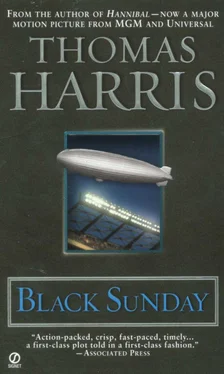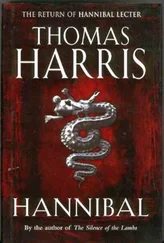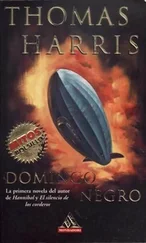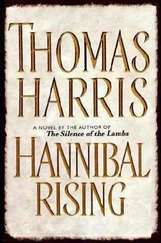He was not prepared for what came next. When he saw the lectern, the room full of prisoners sitting like a class, when he was told that he must read his confession to them, he froze.
He was hustled into an anteroom. A powerful hand smelling of fish was clamped over his mouth while a guard twanged his metacarpals. He was about to faint. He nodded frantically, straining against the hand over his face. He was given another shot while the hand was tied out of sight beneath his jacket.
He read, blinking in the lights, while the movie camera whirred.
Sitting in the front row was a man with the leathery, scarred head of a plucked hawk. He was Colonel Ralph DeJong, senior American officer at the Plantation prison camp. In his four years of imprisonment, Colonel Dejong had done 258 days of solitary confinement. As Lander completed his confession, Colonel Dejong spoke suddenly, his voice carrying through the room. “It’s a lie.”
Two guards were on Dejong instantly. They dragged him from the room. Lander had to read the conclusion a second time. Dejong served one hundred days in solitary confinement on reduced rations.
The North Vietnamese fixed Lander’s hand at a hospital on the outskirts of Hanoi, a stark building whitewashed inside, with cane screens over the openings where the windows had been blown out. They did not do a pretty job. The red-eyed surgeon who worked on Lander did not have the training for cosmetic surgery on the red spider clamped to his table, and he had few drugs. But he had stainless-steel wire and ligatures and patience and, eventually, the hand functioned again. The doctor spoke English and exercised his English on Lander in maddeningly tedious conversations while he worked.
Lander, desperate for some distraction, looking anywhere but at his hand while the work went on, saw an old French-made resuscitator, obviously unused, in the corner of the operating room. It was driven by a DC motor with an eccentric flywheel pumping the bellows. Gasping, he asked about it.
The motor was burned out, the doctor said. No one knew how to fix it.
Driving his attention into any corner where it might escape the pain, Lander talked about armatures and how they are rewound. Beads of sweat stood out on his face.
“Could you repair it?” The doctor’s brow was furrowed. He was tying a tiny knot. The knot was no bigger than the head of a fire ant, no bigger than a tooth pulp, bigger than the blazing sun.
“Yes.” Lander talked about copper wire and reels, and some of the words were cut off in the middle.
“There,” the doctor said. “That finishes you for now.”
The majority of American POWs behaved in a manner admirable in the eyes of the American military. They endured for years to return to their country with a crisp salute slanting above their sunken eyes. They were determined men with strong, resilient egos. They were men for whom beliefs were possible.
Colonel Dejong was one of these. When he emerged from solitary confinement to resume command of the POWs he weighed 140 pounds. Deep in his skull his eyes glowed redly, as a martyr’s eyes reflect the fire. He had not passed judgment on Lander until he saw him in a cell with a spool of copper wire, rewinding the armature on a North Vietnamese motor, a few fishbones beside him on a plate.
Colonel Dejong passed the word and Lander received the Silence in the compound. He became an outcast.
Lander had never been able to bring his usual level of craftsmanship to bear on the jerry-built system of defenses that allowed him to survive. His disgrace before the other prisoners, the isolation that came later, were all the old, bad times come back again. Only Jergens would talk to him and Jergens was often in solitary. He was taken away whenever he could not stop yelling.
Weakened by his wound, riddled with malaria, Lander was stripped down to his two ill-matched parts—the child, hated and hating, and the man he had created in the image of what he wanted to be. The old dialogues in his head resumed, but the voice of the man, the voice of sanity remained the stronger. He endured in this state for six years. It took more than prison for Lander to let go and allow the child to teach the man to kill.
On the last Christmas of his captivity, he was given one letter from Margaret. She had a job, it said. The children were all right. A picture was enclosed, Margaret and the children in front of the house. The children were longer. Margaret had gained a little weight. The shadow of the person who took the picture lay in the foreground. The shadow was wide. It fell on their legs. Lander wondered who had taken the picture. He looked at the shadow more than he looked at his wife and children.
On February 15, 1973, Lander was led aboard an Air Force C-141 at Hanoi. An orderly fastened his seat belt. He did not look out the window.
Colonel Dejong was also on the plane, though he was hard to recognize. His nose had been broken and his teeth kicked out in the past two years as he set an example of noncooperation for his men. Now he set an example by ignoring Lander. If Lander noticed, he did not show it. He was gaunt and sallow and subject any second to a malarial chill. The Air Force doctor aboard the plane kept a close eye on him. A refreshment cart went up and down the aisle constantly.
A number of officers had been sent along on the plane to talk with the POWs, if they wanted to talk. One of these men sat by Lander. Lander did not want to talk. The officer called his attention to the goodie wagon. Lander took a sandwich and bit into it. He chewed several times, then spit the bite into his barf bag. He put the sandwich in his pocket. Then he put another sandwich in his pocket.
The officer beside him started to reassure him that there would be plenty of sandwiches, then decided against it. He patted Lander’s arm. No response.
Clark Air Force Base, the Philippines. A band was there, and the base commander, ready to greet the men. Television cameras were waiting. Colonel Dejong was to be first off the plane. He walked down the aisle toward the door, saw Lander, and stopped. For a second there was hate in Dejong’s face. Lander looked up at him and quickly turned away. He was trembling. Dejong opened his mouth, then his expression softened by a millimeter and he walked on, into the cheers, into the sun.
Lander was taken to St. Alban’s Naval Hospital in Queens. There he began a journal, a project he would not continue long. He wrote very slowly and carefully. He was afraid that if he went any faster, the pen might get away from him and write something he did not wish to see.
Here are the first four entries:
St. Alban‘s, March 2.
I am free. Margaret came to see me every day for the first eight days. She has come three times this week. The other days she had car pool. Margaret looks well, but not like I thought about her back there. She looks like she is satisfied all the time. She brought the girls twice. They were here today. They just sat and looked at me and looked around the room. I kept my hand under the sheet. There is not much for them to do in the hospital. They can go down to the rec room and get a Coke. I must remember to get some change. Margaret had to give them the change. I suppose I look strange to them. Margaret is very good and patient and they obey her. I dreamed about the Weasel again last night and I was absent-minded talking to them today. Margaret keeps up the conversation.
St. Alban‘s, March 12.
The doctors say I have falciparum malaria and that is why the chill cycle is irregular. They are giving me chloroquine, but it doesn’t work immediately. A chill caught me today while Margaret was here. She has her hair cut short now. It does not look like her too much, but it smells good. She held me during the chill. She was warm, but she turned her face away. I hope I don’t smell bad. Maybe it’s my gums. I’m afraid Margaret will hear something. I hope she never saw the film.
Читать дальше












